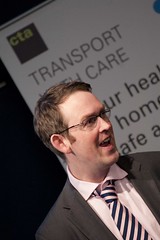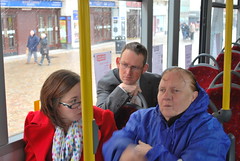Twelve months ago I had never heard of ‘social tourism’. Now, I can’t seem to get it out of my head. Readers may well wonder what the hell I am on about – let me point them towards the All-Party Parliamentary Group I chair on the topic which has just published its report, available at http://www.fhaonline.org.uk/news_story.php?id=110&mpid=9.
I suspect that there will be those who read this report who are as unaware of the concept as I was before I met the Family Holiday Association who prevailed upon me to seize the idea and run with it. This general lack of awareness has to make those of us who participated in this inquiry humble in our aims. We are but a starting point. We aim to build the foundations on which much will subsequently be erected. There must be recognition that raising awareness of what we are talking about, and placing it on the political agenda, are crucial objectives before we can go any further.
There is no getting away from the fact that one of the most immediate themes to emerge from our evidence is the term ‘social tourism’ itself. It confounds people on first hearing it, as it did me. Whether the subject matter discussed in this report will still be referred to as ‘social tourism’ in a few years is open to worthwhile debate. At this early stage we are using the terminology we have available to us, but we must not be overly concerned if this changes over time.
One of the most fascinating things to come out of the inquiry was the myriad of stakeholders engaged in activities that they themselves would not describe as constituting ‘social tourism’. In a sense this report is about shining a spotlight on what is out there now, not about creating something new from scratch. Just try the following websites – the Sandrose Centre for Bereaved Families in Cornwall (www.sandrose.org.uk ), the Holiday Homes Trust (www.holidayhomestrust.org) or Vitalise (www.vitalise.org.uk).
That attracted me to this endeavour over a year ago was the way in which the issue represented an overlap between social policy and tourism policy – two personal interests of mine, and two that matter greatly in my constituency. As Karen White, a Rochester head teacher who gave evidence to the enquiry said “For some of these children, their whole lives are dependent on the State handing out money and, in order to break that culture, you need to create the aspiration”. I think you could almost summarize a life’s mission in that one sentence.
But what made an even greater impact on me was the following contribution:
MS WHITE: One of the things that I found really fascinating when I went there [her current school] is that our families in Medway and certainly the families in my school, or a lot of them, are unbelievably insular and they do not travel. One of the projects that we have got going which we start next year through the Family Holiday Association is actually about visiting our own environment and using that because Rochester is a huge tourist area and you would be amazed at how many of my children and their families do not go the mile down the road to Rochester to be at the Dickens Festival or whatever or go to the dockyard, which has a fantastic museum, because their parents do not understand those, they do not always understand the value of those and they are also incredibly expensive at times and it is something that they cannot afford, so, whilst we live in an area where you can access all of those things, the parents stay very close to home because that is where they feel safe and they do not have the confidence to travel. I was fascinated because, when I was in Hackney, we had parents, and you can go across London and look at all the sights for nothing on the bus, but they do not do it. I had parents who would not go out of Hoxton Market. The vicinity they live in is 500 metres in each direction and that is as far as they go, and it is about security, it is about safety and it is also partly about, “Those things aren’t for us. We’re not the right social class. We don’t do museums, they’re not for us, they’re for the middle‐class people who live in the nice houses up the road”. When you actually investigate this and talk to the parents about it, they will tell you that, that those things are not there for them, so it is about upskilling parents to be able to value taking their children off on these experiences and then being able to use that experience when they are there, asking the right questions, engaging with their children, talking about it and then bringing that back, so we do a lot of work with the parents, and we are planning to do more work with the parents, about what makes a good visit”.
Often, social exclusion is dismissed as a ‘left-wing’ invention. But Karen White’s experience is testament to the reality. It isn’t quite poverty, or lack of education, or any thing you can put your ‘policy finger’ on and flick a switch to reverse. But it is about building up confidence and capacity to be full participants in society. I was disappointed the Times headlined their report “Free holidays for the poor” since that is such a simplistic analysis of what is actually a profound and subtle application of the theory of early intervention. No-one ever said social policy was easy, and I can’t claim to be surprised at how many have sought to dismiss these ideas on initial consumption.
The breadth of the scope is reflected in the variety of stakeholders who submitted written and oral evidence. For witnesses and evidence takers, regardless of whether they were coming at the issue from a social policy or tourism perspective, everyone involved has consistently sought to ground their views in as strong an evidence base as possible. It would be naïve to not address the fact that we are living in constrained economic times, with no giant pot of money at the Government’s disposal. What this report has tried to do is put forward a range of ideas grounded in the evidence we have collected that will not necessitate vast sums of Government expenditure.
Finally I would like to take the opportunity to thank all those who made the inquiry possible, especially my parliamentary colleagues Bob Russell, Tony Baldry and Anne Marie Morris. It required a great deal of time, effort, organisation and cooperation from many people and organisations. This report is the result of all that hard-work. Now we have to make a concerted effort to take the ideas contained within the report forward to a broader audience. After all this is merely the beginning of a long process.





